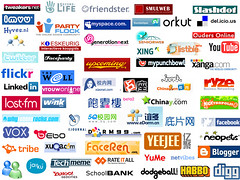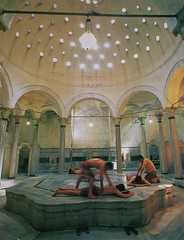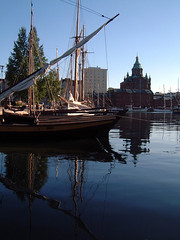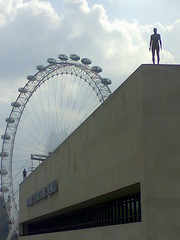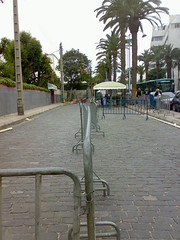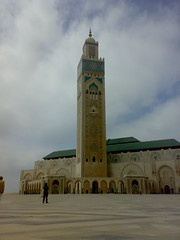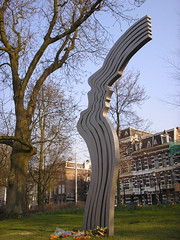skip to main |
skip to sidebar
I received a few weeks back by post Finnish philosopher Pekka Himanen’s latest publication called The Finnish Dream (Suomalainen unelma). The report written by the innovation specialist still suffering from being branded in the beginning as a wunderkind was commissioned by the Finnish technology industry to outline new visions for the future of the country’s information society. Himanen made his name some years back by researching the Finnish Wirtschaftswunder of the 1990s together with leftish sociologist Manuel Castells. With Finnish Dream he attempts to shift the focus from historical analysis to bold visions. Himanen’s task is not easy: he tries to tell a prosperous country with a growing economy that it needs to change.
I have met Himanen several times in the course of the last five years. The more I have heard him speak, the more I think he makes sense. The fact that he stresses that models from one country cannot just be copy-pasted to another is a valuable reminder for policymakers hungry for snappy solutions. The stumbling start of Dutch innovation policy based on the Finnish model is a good example of the complexity.
Pekka's lectures have also gotten a softer and softer tone which I value highly. His latest booklet continues on this path. I must confess that I was somewhat surprised when realising that his main message in Finnish Dream seems to be that the key to success is fairness, openness, trust and encouragement. Through analysing success stories such as Plato’s Academy, Cambridge, Kone, Google and Silicon Valley he concludes that the key to success is an enriching but competitive community of empowered individuals. Size does not matter, Himanen says, and therefore says that by focusing remote regions like the Helsinki region could be global players. A spirit of sharing in order to succeed is much more important than sheer size. He points out that people are willing to go further if their primary needs are fulfilled which makes him an advocate for a welfare state based on equality.
Pekka makes it very easy for me to support his notions. He takes the discussions – rare in the Nordic context – of society back to the individual. His way of asking the reader to think when you perform at your best is convincing. Clear goals, recognition of individual needs and encouragement make all of us succeed which ought to be the dominant approach both in schools, offices as well as in universities. Stressing the role of the individual as the starting point makes his argument for a just and fair welfare state even stronger: idealism and equality should not be used as an excuse for not working hard. Being brilliant is hard work but it can be fun.
It is half past midnight on a Tuesday-Wednesday night as I am posting this. I ought to be sleeping but while brushing my teeth, I had this revelation which I just thought that I need to write down immediately.
I got back from a worktrip from Istanbul tonight. It seems that my fate for the next year at least is to be an advocate for intercultural and inter-generational debate. I feel very passionate about praising how clever young people are with the media. At work we are preparing a big festival for June 2008 around user-generated content. I realised that while talking full-time about this subject I should also look into my own media use every now and then.
As I press F9 on my iBook, I can see all the windows I have open on my laptop. Currently I have Flickr (photo), MSN (chat), Linkedin (networks), Skype (chat), Facebook (networks) and Blogger (weblogs). This is relatively normal.
I know a lot of people could find this sad or pathetic. I have also come across the question:"Why don't you read a book or hang around with your friends?"
The answer is obvious to those familiar with these tools: I am hanging out with my friends. 20 years ago it would not have been possible chatting on a normal evening with friends in Finland, New York, California, London and what have you. The common misconception is that young people are replacing "normal" interaction with talking to strangers online. This is not the case. I just use myself (although not that young anymore) as evidence. I share things with people I know. I am a Finn living in another country. 20 years ago it would have been close to impossible for me to keep in touch with all my friends or share things daily with my family. Of course I also hang out with the friends here in Amsterdam but it is extremely rewarding that I can chat for hours and hours with people I have known for years but who happen to live far away.
Tools like Facebook are fantastically intelligent in helping you to keep private things among your friends and other things shared with millions - just like it has always been.
Once again visiting my favourite city in the world, Istanbul. My colleague Raya and I are here for a network meeting on our video project. Due to cheaper flights we came already yesterday and therefore have spent yesterday evening meeting friends and just spending time together.
I tested a hamam last week in Casablanca and decided to go to one again today. I love it. I must say - apologies for my unpatriotic approach - that I like the hamam much more than a Finnish sauna. In the hamam the temperature is not that high and you sweat much more. In the Turkish ones they have managed to turn it into a service with scrubs and massage and so forth.
The hamam is always gender-divided. On the men's section the atmosphere is a lot of fun. The old men seem to enjoy telling younger - especially tourist - men what they should do and where to go. What I love is that the instructions are never in English. And why should they? The men washing you just tap you on the back when you have turn around and the others point with their finger where to go.
I was a bit intimidated by the stories I have heard about the harsh massage. And the stories were accurate. I heard crunches unfamiliar to me when the middle-aged man was pressing my back. But now, after two hours, I must say that I feel fantastic.
This is what they should do also in the Nordic countries. Make public saunas clean and offer different treatments for a decent price.
So a week of work done. Lately I have basically lost the difference between weekends and weekdays due to work-related trips. Tomorrow I am off to Istanbul with a colleague of mine to have a meeting with the public broadcasters that collaborate with us on theoneminutesjr project. Istanbul is my favourite city in the world so I am not complaining.
It has been a relatively good week altogether. I started from London with a visionary discussion on higher education and continued for Tuesday and Wednesday in Helsinki for meetings and a oneminutesjr workshop and on Thursday flew back to Amsterdam.
Our team grew on Thursday as our intern started. She seems great and will definitely help us in daily work as well as in brainstorming.
I think I have written about this before but it does not hurt to say the obvious: I have a great family. I realised it once again when I saw them for two evenings in Helsinki. Apart from being dear to me, they are also humane and good people. Having worked with orphans and people who have lost their families in civil wars, sometimes it is good to remind yourself that these things should not be taken for granted. My homies are fab folks.
My nephew has started walking which is funny to observe. He seems to have a healthy (un-Finnish) self-esteem because he trusts his still slightly wobbly feet a bit too much. You hear a stomp every too minutes but when you turn to see if he hurt himself, he is already on his way to new dangers. Funny dude.
I got back from Morocco on Saturday evening a half an hour before midnight having plane once again delayed when departing from Paris’ Charles de Gaulle airport. That airport and me – not a match made in aviation heaven. Well anyway, my stay in the Netherlands was extraordinarily short as I left on Sunday morning to London for a British Council conference on higher education. Currently I am in Helsinki for seeing some people for work and seeing how theoneminutesjr workshop is running.
On Sunday – although somewhat exhausted – I decided to make some room in my agenda for high culture. A friend of mine had recommended the Antony Gormley exhibition in Hayward Gallery so I made my way through Central London, crossed the Thames and walked to the South Bank. Even with some waiting outside in line, Gormley’s exhibition was definitely the right move for the day.
Gormley works with extremely heavy sculptures mostly somehow using his own body as the subject mostly using lead as his material. His clever invention was not to limit himself into the gallery but scatter his works on the rooftops of London. I love the idea. When one stands on the terrace of the gallery, one can easily spot some 20 iron men standing on rooftops. I love this kind of project which question where art belongs and makes art accessible for greater numbers of people. In the gallery I witnessed a father and daughter engaged in a dialogue:
”Oh, daddy, there’s one!”
”Sweety, let’s see how many we can spot.”
The major revelation in the Blind Light exhibition was the work actually named Blind Light which is basically a big cloud-filled glass box with fluorescent white light. The effect is extraordinary. One enters the box and within 20 seconds you lose all sense of orientation. It is wet and cold inside, you don’t know where the entrance was and you see people appearing and disappearing. Of course a rational person knows that by following the walls you end up to the entrance but I must confess that the room puts the thought into your head: what if I just don’t find my way out?
With the glass box Gormley poses an interesting question – what is natural and what is unnatural? By taking the natural and uncertain inside and forcing people to be observed by others from the outside, he manages to question some of our notions of reality. As he writes in the booklet:”Architecture is supposed to be the location of security and certainty about where you are. It is supposed to protect you from the weather, from darkness, from uncertainty. Blind Light undermines all that.”
If in London before 19 August, I highly recommend Blind Light.
Third day in Casablanca. Or fourth, not exactly sure. I think fourth. Today we had workshops run a peer basis by the participants of the meeting. Really interesting discussion on issues such as:
- social responsibility of editors ("I feel that I do have a responsibility towards my readers and the society to give a broader picture of what women do and can do.")
- editor-contributor relations ("But the bottomline is that if you don't like the way your stuff is edited, you can just write to the web if you wish.")
- advertising ("Our first spread is always journalistic content, not advertisement. That is sort of a strong statement that content comes first.")
Apparently there has been a terrorist attack yesterday in Algeria. As we are in the area with most of the consulates, the fear is quite present. We have had participants ending into problems for photographing (near) the consulates and new barricades appearing every night.
I really feel awkward about this. I mean it is a somewhat twisted sense of security that guns would make unarmed civilians feel safer. i just feel that all these roadblocks and barricades just create more hatred and an uneasy atmosphere.
Quick slash before rushing to the hotel and to the shower. My work has taken me for this week to Morocco where we are organising a workshop for some 50 editors of European and North African pop culture publications. The weather is wonderful and the atmosphere is relaxed - just like it should be. Today's results:
- new friends and professional contacts
- good visibility for the ECF
- problems with bureaucracy
- pair of trousers and two pairs of slippers
We had today two Spanish speakers talking about their experience from working with North African partners. This quote was the most fascinating one:
"But I mean we in Spain have six centuries of Arab history. I feel we Spanish have a special responsibility for this relationship. I think culturally we are closer to Maghreb (North Africa) than to Sweden for instance."
I realised that I have forgotten to link this article to my blog. I wrote an article (in Finnish) for the biggest Finnish student newspaper on the new government of the Netherlands. I wrote this already in April but completely forgot the issue. In the article I described the press reactions to the cabinet programme stressing the importance of the family as the most important bridge to happiness.
Well, here it is for those who understand Finnish.
(picture is the memorial of the killed film director Theo van Gogh)

